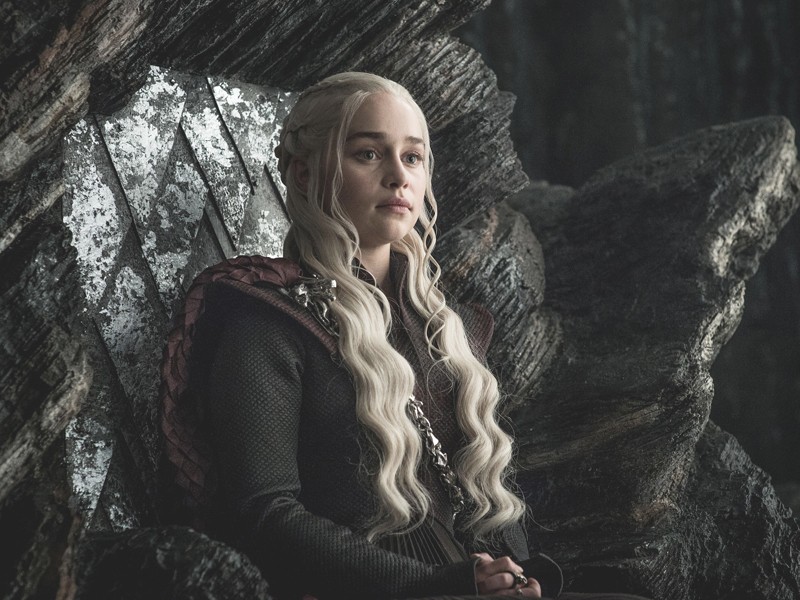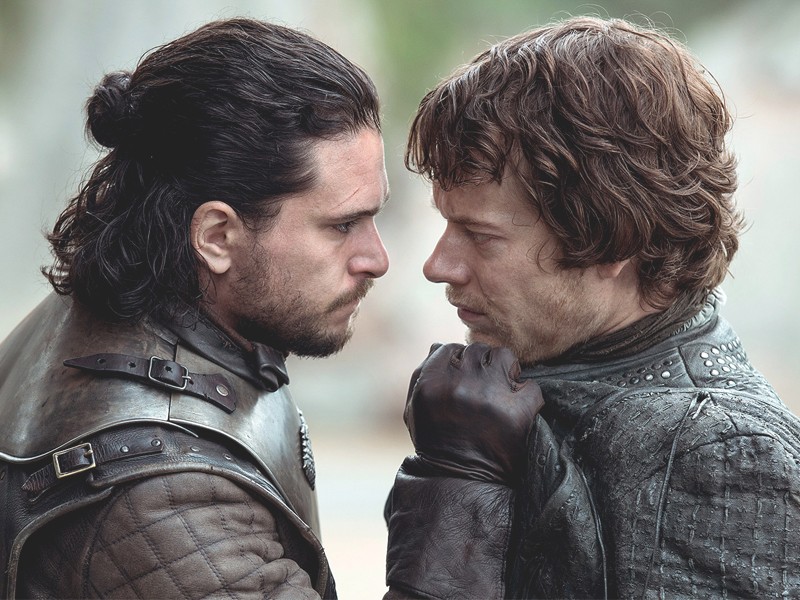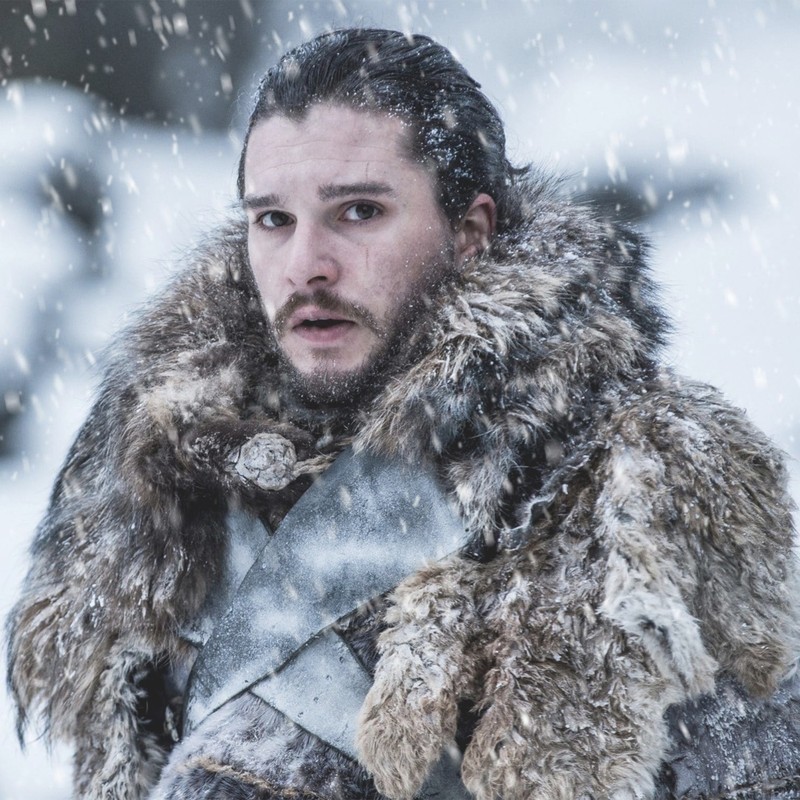Why It’s Totally Acceptable To Love Game Of Thrones
The show that launched a thousand careers, Game of Thrones has gone on to become the most talked-about show on TV – as well as the most watched – since it hit our screens in 2011. Based on George R.R. Martin's A Song of Ice and Fire books, the show focuses on two powerful families – kings and queens, knights and renegades, liars and honest men – playing a deadly game for control of the Seven Kingdoms of Westeros.
Fast-paced and political, for millions it’s the most exciting thing on telly. But for some, the presence of dragons, zombies and chainmail is enough to leave them reaching for the remote. To set the record straight, we canvassed the nay-sayers in the SheerLuxe office to discover why they don’t fancy watching the series, and set about busting the misconceptions behind the hit show…
“There’s too much to catch up on.”
Given that we’re now about to embark on an eighth series, we can understand what a daunting undertaking it is to settle in for seven ten-hour series. Still, make it through to the end of the first series and you’ll be hooked. Put it this way, we’ve yet to meet anyone who got to series two and couldn’t be bothered to watch the rest.
“It sounds really bloke-y.”
When we first meet the inhabitants of the Seven Kingdoms, it’s very much a man’s world. Hedonistic Robert Baratheon is on the Iron Throne. His serious right-hand man Ned Stark is King in the North. The cruel Lannisters are ruled by the fearsome Tywin, and the Tyrell’s are overseen by Mace. The Ironborn are led by brutal Balon Greyjoy, and what’s left of the exiled Targaryen family is headed up by feeble, double-crossing Viserys.
By series seven, there’s a bastard in command in the north and scheming Cersei Lannister is on the Iron Throne. The Ironborn are led by Yara Greyjoy, the Tyrell’s are overseen by 90-something matriarch Lady Olenna and Daenerys Targaryen leads her own army – and has three dragons to boot. Game of Thrones might be loved by blokes – and feature the odd bit of swordplay – but the series showcases some of the most powerful women ever seen on screen.
First there’s Cersei Lannister who, going into series eight, currently sits on the Iron Throne. Her three children are dead. Her husband and powerful father have been murdered. Her brothers have abandoned her. Yet she’s seized what she believes is rightfully hers. Even if she’s done it in the most despicable manner, it’s hard not to admire her ambition.
Daenerys Targaryen, Breaker of Chains and Mother of Dragons, was meant to be murdered as a child and has had assassins following her ever since. Now on Westeros after years in exile, she believes the Iron Throne is hers by birthright. As well as steely determination, she has dragons – and a point to prove.
Then we come to the Starks. The two daughters of noble Ned, both Sansa and Arya are principled, hardened and capable of surviving some of the series’ most horrific events. Sansa Stark has been through hell: she’s survived two forced marriages, multiple rapes and has seen her parents and brother murdered before her. Yet she’s still here.
Arya Stark – the youngest of the two – is surely the favourite to take the Iron Throne come the end of the series. Cunning and deadly with a sword, Arya is back on Westeros soil after time across the Narrow Sea preparing for her final challenge. The youngster even has a kill list – one which has become considerably shorter as the series progresses.
Then there’s Brienne of Tarth, a six-foot-something warrior with one of the best sword swings in the Seven Kingdoms. A Lady who’d rather be considered a warrior, Brienne is one of the show’s most moral, trustworthy characters.
As Lady Olenna says in series seven: “I’ve known a lot of clever men in my time and I’ve outlived them all. You know why? I ignored them.” Trust us, going into the final series, it’s not the dick-swinging meatheads who are left standing, it’s the women they harmed along the way who wield the power now.
“I find the dragons off-putting.”
First up, the scaly trio barely even feature, at least for the first few series anyway. Partially, this is because Drogon, Rhaegal and Viserion are rather expensive – the CGI production values each time a dragon appears on screen make the lead actors’ $300,000-per-episode fee seem paltry. But their absence is also down to the fact that this ongoing war is very much rooted in reality.
Yes, there are giants, dragons and, ahem, the army of the undead (that’s White Walkers to fans) but we promise, fantasy is not the focus of the show. Game of Thrones has always been about human interactions – about shifting allegiances, silent power struggles and ultimate betrayals. Whether it’s inter-family battles for power or wider strategies concerning rival houses, the show’s dialogue and political manoeuvrings are what makes the show so compulsive. A typical costume drama this ain’t.


“I hate shows with made-up languages.”
This isn’t Lord of The Rings and we promise there’s not a jot of Elvish to be found. In fact, any Dothraki, the language spoken by nomadic people in the series’ fictional world, or High Valerian probably amounts for less than 1% of the show. George R.R. Martin has repeatedly stated he is not a linguist, and thus never invented full languages for his fantasy world the way J.R.R. Tolkien did for Middle Earth. Instead, the producers hired linguist David J. Peterson to construct the artificial languages for the TV series, which flow like an actual language with grammar and meaning, so you’ll find yourself drawn in rather than alienated. Still not impressed? What little foreign dialogue there is on the show is subtitled, so you’ll get over it.
“I don’t like action films.”
More often than not the dominant scenes in Game of Thrones are intense conversations with not a sword in sight. But given how much time is dedicated to scheming, negotiations, the delivery of sealed letters via ravens and ruminating over who’s out to get who next, when battle scenes do emerge, you relish them.
Take the ‘Battle of the Bastards’ in season six. A duel between House Stark and House Bolton, it’s a gory centrepiece that makes the production on most war sagas look pathetic. The episode necessitated 600 crew members, 500 extras and 70 horses, all shot over 25 days. Many have called it the best episode of the series, and it’s regarded as one of the greatest television episodes of all time for its direction, writing, performances and cinematography. Trust us, as you’re watching it unfold – invested as you are in the characters – a cosy rom-com is the last thing you’ll be craving.
“There’s too much sex.”
We’ll admit, the first few series were rather gratuitous when it came to nudity, particularly when it came to the women of Westeros: it might be an American blockbuster, but the producers are certainly not afraid to flaunt the no-nipple rule which often applies to US TV. Come series seven, this isn’t the case, and we’d argue that those earlier sex scenes were set up to either redeem or condemn the men at the centre of them, or show the strength of character of the women, as the narrative progresses.
In the case of Tyrion Lannister – a dwarf with a strong sexual appetite and the money to fund it – his season one scenes with prostitute Shae contrast widely with the noble, principled right-hand man to Daenerys he becomes. The early availability of women also goes to show how others don’t act upon their urges. Essentially, the way men treat women in the bedroom – or cave, if you’re Jon Snow – separates the good guys from the bad. Still, we wouldn’t recommend watching the show with your parents.
“The acting is terrible.”
Aside from Sean Bean who – spoiler alert – didn’t last long back in the first series, most cast members were relative unknowns. Among them was a slew of former Hollyoaks, Skins, Shameless and Doctors cast members. Naturally, this parade of low-budget British cast members gave some viewers the idea that this was a low-calibre drama. However, just like the Harry Potter film series, the acting from the younger cast members has improved every series, and there’s no denying that the likes of Tyrion (Peter Dinklage), Bronn (Jerome Flynn), Jon Snow (Kit Harrington), Cersei (Lena Headley) and Robb Stark (Richard Madden) have always driven the show forward. We’ll admit we could have done without the Ed Sheeran cameo last series, though.
Still not a fan of one or two of the actors? Fret not – they’ll more than likely be dead soon. Unlike many authors, George R.R. Martin isn’t afraid to kill off his most-loved creations. In most TV shows you know your favourites won’t die, but in Game of Thrones, almost everybody perishes, so you’re constantly kept on your toes.
“I hate sci-fi.”
Game of Thrones is often labelled ‘sci-fi’, but this couldn’t be further from the truth – for a start it predates anything futuristic by about 1,000 years. And, to come back to our point on fantasy, the aspects which make the drama otherworldly only help to embed us in another time and place.
Politics, family, money, power: like all the greatest TV shows – The Sopranos, Breaking Bad, House of Cards, The Wire – these are the vital ingredients for a great series. Often dubbed ‘The Sopranos with swords’, even if you took away the dragons and axes, the premise of Game of Thrones could be transposed into any environment. But why would you want it to? We love the costumes – some of Daenerys' and Cersei’s looks wouldn’t look out of place on a McQueen catwalk – the scenery is breathtaking and the soundtrack soars. Game of Thrones is escapism at its greatest and – best of all – is entirely unpredictable. We can’t wait to see what the final season has in store.
Series eight begins on Sky Atlantic at 9pm on Monday 15th April. All previous episodes are available to watch on Now TV.
DISCLAIMER: We endeavour to always credit the correct original source of every image we use. If you think a credit may be incorrect, please contact us at info@sheerluxe.com.


